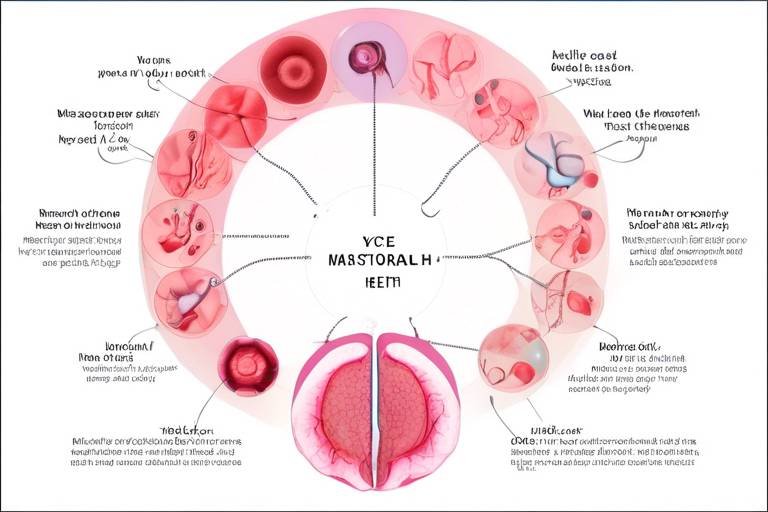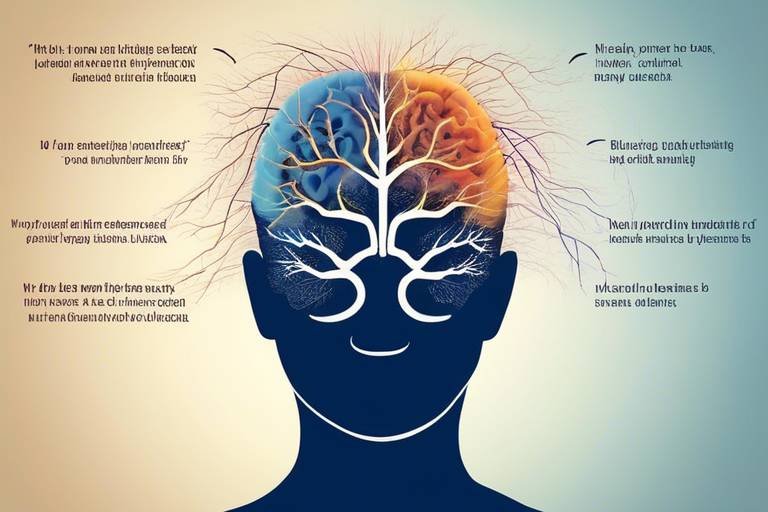The Biology of Fatigue - Understanding Energy Levels
Fatigue is a common experience that many of us face, yet its underlying biological mechanisms are often misunderstood. This article aims to peel back the layers of fatigue, revealing the intricate biological processes that contribute to our energy levels. By understanding these mechanisms, we can better address the causes and effects of fatigue, ultimately enhancing our overall well-being. Imagine your body as a car; just as a vehicle requires fuel to run smoothly, our bodies need energy to function optimally. But what happens when that energy runs low? This is where the biology of fatigue comes into play.
At its core, fatigue is a complex interplay of physiological processes that dictate how our bodies generate and utilize energy. The primary source of energy in our bodies is adenosine triphosphate (ATP), which is produced in our cells through a process called cellular respiration. When we engage in physical activities or even simple tasks, our bodies convert stored nutrients into ATP. However, various factors can disrupt this energy production, leading to feelings of fatigue. For example, inadequate oxygen supply, imbalanced nutrition, and hormonal fluctuations can all play a role in diminishing our energy levels. It's like trying to run a race with a flat tire; without the right support, it's nearly impossible to keep going.
Fatigue isn't a one-size-fits-all experience; it can manifest in various forms, each with its unique characteristics and implications for health. Understanding these types can help us identify the root causes of our fatigue and address them more effectively. The primary categories of fatigue include:
- Physical Fatigue: This type arises from prolonged exertion and can significantly impact athletic performance.
- Mental Fatigue: This form affects cognitive function, leading to decreased productivity and focus.
- Emotional Fatigue: Often linked to stress and emotional strain, this type can leave individuals feeling drained and overwhelmed.
Physical fatigue is something many athletes and fitness enthusiasts are all too familiar with. It results from prolonged exertion, whether it's a grueling workout or a long day at work. The symptoms can vary, but common indicators include muscle weakness, decreased performance, and a general sense of tiredness. The causes of physical fatigue are numerous and can include:
Several factors contribute to physical fatigue, such as:
- Overtraining: Excessive exercise without adequate rest can lead to burnout.
- Dehydration: Not drinking enough fluids can sap your energy levels significantly.
- Inadequate Nutrition: A diet lacking essential nutrients can hinder your body's ability to produce energy.
To combat physical fatigue, a variety of recovery techniques can be employed. These methods not only help restore energy levels but also enhance overall performance. Some effective strategies include:
- Rest: Allowing your body time to recover is crucial.
- Nutrition: Consuming a balanced diet rich in vitamins and minerals can support energy production.
- Hydration: Drinking plenty of fluids is essential for maintaining energy levels.
Mental fatigue, on the other hand, is often overlooked but can be just as debilitating. It affects cognitive function, leading to a decline in productivity and focus. Symptoms of mental fatigue include difficulty concentrating, irritability, and a general sense of being overwhelmed. Factors contributing to mental fatigue often stem from excessive workload, lack of sleep, and high-stress environments.
Understanding the various factors that influence fatigue levels is crucial for maintaining energy. Lifestyle choices, sleep quality, and stress levels all play significant roles in how energized we feel. For instance, poor sleep can lead to a vicious cycle of fatigue, as lack of rest impairs our ability to perform daily tasks, which in turn can lead to more fatigue.
Quality sleep is not just a luxury; it's a necessity for energy restoration. Our bodies undergo various restorative processes during sleep, including muscle repair and memory consolidation. Poor sleep hygiene can lead to chronic fatigue, making it essential to prioritize good sleep practices. Aim for 7-9 hours of quality sleep each night, and consider establishing a calming bedtime routine to signal to your body that it's time to wind down.
Chronic stress can be a significant contributor to feelings of fatigue. When we experience stress, our bodies produce hormones like cortisol, which can interfere with our energy levels. Managing stress through techniques such as mindfulness, exercise, and adequate rest can help mitigate its effects on fatigue. Think of stress as a leaky faucet; if left unchecked, it can drain your energy over time.
What is fatigue?
Fatigue is a state of extreme tiredness or exhaustion that can affect physical, mental, and emotional well-being.
What causes fatigue?
Fatigue can be caused by various factors, including overexertion, poor nutrition, lack of sleep, and chronic stress.
How can I combat fatigue?
To combat fatigue, focus on getting adequate rest, maintaining a balanced diet, staying hydrated, and managing stress levels.

The Science of Fatigue
Understanding the physiological processes that contribute to fatigue is essential for anyone looking to enhance their energy levels and overall well-being. Fatigue isn't just about feeling tired; it’s a complex interplay of biological systems that dictate how our bodies generate and utilize energy. At the core of this phenomenon is the way our cells produce adenosine triphosphate (ATP), the primary energy currency of the body. When we engage in physical or mental activities, our muscles and brain require ATP to function optimally. However, when energy demands exceed production, fatigue sets in.
The process of energy production begins in the mitochondria, often referred to as the powerhouse of the cell. These tiny organelles are responsible for converting nutrients from the food we eat into ATP through a series of biochemical reactions. Key factors such as oxygen availability, nutrient intake, and metabolic efficiency play significant roles in this process. When any of these factors are compromised, our energy levels can plummet, leading to that all-too-familiar sensation of fatigue.
Moreover, fatigue can be influenced by a variety of external and internal factors. For instance, hormonal imbalances, such as those seen in conditions like hypothyroidism or adrenal fatigue, can drastically affect how our bodies manage energy. Similarly, lifestyle choices, such as poor diet, lack of exercise, and inadequate sleep, can exacerbate feelings of tiredness. It’s like trying to drive a car on empty; no matter how much you push the accelerator, without fuel, you’re not going anywhere.
Additionally, the body's natural circadian rhythms—our internal clock—regulate sleep-wake cycles and influence energy levels throughout the day. Disruptions to these rhythms, whether from shift work, travel, or excessive screen time, can lead to chronic fatigue. It's crucial to recognize that fatigue is not merely a symptom of overexertion but a multifaceted issue that requires a comprehensive understanding of our biological makeup.
In summary, the science of fatigue encompasses a wide array of physiological processes, from cellular energy production to hormonal regulation and lifestyle factors. By gaining a deeper understanding of these mechanisms, we can take proactive steps to combat fatigue and improve our energy levels. The next sections will explore the different types of fatigue, their causes, and effective recovery strategies to help you reclaim your vitality.
- What are the main causes of fatigue? Fatigue can be caused by various factors, including physical exertion, lack of sleep, poor nutrition, and chronic stress.
- How can I improve my energy levels? Improving energy levels can be achieved through a balanced diet, regular exercise, adequate hydration, and quality sleep.
- Is fatigue always a sign of an underlying health issue? Not necessarily. While fatigue can indicate health problems, it can also result from lifestyle choices or temporary stressors.
- How does sleep affect fatigue? Quality sleep is essential for energy restoration and overall health; poor sleep can lead to increased fatigue during waking hours.

Fatigue is not just a simple feeling of tiredness; it comes in various forms, each with its own unique characteristics and implications for our health. Understanding the different types of fatigue can help us identify the root causes of our energy depletion and address them effectively. The three primary types of fatigue are physical fatigue, mental fatigue, and emotional fatigue. Each type affects us in different ways and can significantly impact our daily lives.
Physical fatigue is what most people think of when they hear the word "fatigue." It arises from prolonged physical exertion, whether it's from a tough workout, a long day at work, or even just running around after kids. When your muscles are overworked, they become depleted of energy, leading to a sensation of tiredness. Symptoms can include muscle weakness, soreness, and a general feeling of heaviness in the body. If you’ve ever felt like you could sleep for a week after a marathon or an intense gym session, you know exactly what physical fatigue feels like!
On the other hand, mental fatigue can sneak up on you when you least expect it. It affects our cognitive functions, making it difficult to focus, think clearly, or make decisions. Imagine trying to solve a puzzle with missing pieces; that’s what mental fatigue feels like. It can be triggered by long hours of work, studying, or even prolonged screen time. Symptoms may include forgetfulness, irritability, and a general sense of being overwhelmed. If you’ve ever stared at your computer screen, unable to process any more information, you’ve experienced mental fatigue firsthand.
Then there’s emotional fatigue, which often gets overlooked. This type of fatigue arises from emotional stressors—think of it as the emotional equivalent of running a marathon. It can stem from various sources, including relationship issues, work-related stress, or even global events that weigh heavily on our hearts. Symptoms can manifest as feelings of apathy, sadness, or even anxiety. Emotional fatigue can leave you feeling drained, as if you’ve been carrying a heavy backpack full of worries for too long.
To make it easier to understand the differences between these types of fatigue, here’s a quick comparison:
| Type of Fatigue | Causes | Symptoms |
|---|---|---|
| Physical Fatigue | Prolonged physical activity, overtraining | Muscle weakness, soreness, heaviness |
| Mental Fatigue | Extended cognitive tasks, stress | Poor concentration, irritability, forgetfulness |
| Emotional Fatigue | Emotional stressors, unresolved conflicts | Apathy, sadness, anxiety |
By recognizing the signs of each type of fatigue, we can take proactive steps to address them. Whether it’s through physical recovery techniques, mental breaks, or emotional support, understanding the nuances of fatigue can empower us to enhance our energy levels and improve our overall well-being.

Physical fatigue is one of those things that can really knock the wind out of your sails. You know that feeling when you’ve just pushed yourself a bit too hard at the gym or after a long day of manual labor? That overwhelming sense of tiredness that makes even the idea of climbing the stairs seem like an insurmountable task? Yeah, that’s physical fatigue. It’s not just about feeling tired; it’s a complex physiological response that can significantly impact your daily life and overall athletic performance. Understanding the symptoms, causes, and recovery strategies can be a game-changer in managing this fatigue effectively.
When we talk about physical fatigue, we’re referring to a decrease in the body’s ability to perform work, which can be a result of various factors. Symptoms can range from a general feeling of tiredness to more specific signs like muscle weakness, decreased stamina, and even soreness. Imagine running a marathon—your legs might feel like lead, and you may struggle to catch your breath. This is your body signaling that it’s time to take a break and recharge.
So, what causes this kind of fatigue? Well, there are several culprits, and they often work in tandem. Here are a few key factors:
- Overtraining: Pushing your body beyond its limits without sufficient recovery can lead to significant fatigue.
- Dehydration: Not drinking enough water can sap your energy levels and hinder performance.
- Inadequate Nutrition: Fueling your body with the right nutrients is essential for maintaining energy levels. A poor diet can lead to deficiencies that exacerbate fatigue.
Now that we’ve covered some of the causes, let’s talk about recovery techniques. After all, it’s not just about knowing what’s wrong; it’s also about how to fix it! Here are some effective strategies to combat physical fatigue:
| Recovery Technique | Description |
|---|---|
| Rest | Allowing your body time to recover is crucial. This includes both sleep and rest days. |
| Nutrition | Eating a balanced diet rich in carbohydrates, proteins, and healthy fats can help restore energy. |
| Hydration | Drinking enough water is vital for maintaining energy levels and preventing fatigue. |
Incorporating these recovery techniques into your routine can make a world of difference. Just like a smartphone needs to be charged to function, your body requires proper rest and nutrition to keep going. So, the next time you feel that wave of fatigue wash over you, remember that it’s your body’s way of telling you to slow down and take care of yourself. Listen to those signals, and you’ll find that you can bounce back stronger than ever!
Q: How can I tell if I’m experiencing physical fatigue or just tiredness?
A: Physical fatigue usually involves a significant decrease in performance and can be accompanied by muscle weakness and soreness. If you're feeling consistently drained, it might be more than just temporary tiredness.
Q: What’s the best way to recover from physical fatigue?
A: The best recovery involves a combination of rest, proper nutrition, and hydration. Make sure you’re giving your body time to heal and replenish its energy stores.
Q: Can I continue exercising if I’m feeling physically fatigued?
A: It’s generally advisable to listen to your body. If you’re feeling fatigued, it might be best to take a break or opt for lighter activities until you feel more energized.

Physical fatigue is more than just feeling tired after a long day; it's a complex phenomenon influenced by various factors that can drain your energy and hinder your performance. One of the primary causes of physical fatigue is overtraining. Athletes and fitness enthusiasts often push their bodies to the limit, believing that more is always better. However, this can lead to a state where the body doesn't have enough time to recover, resulting in decreased performance and a feeling of exhaustion that just won't go away.
Another significant contributor to physical fatigue is dehydration. Our bodies are composed of about 60% water, and when we don't replenish our fluids, it can lead to a drop in energy levels. Imagine trying to run a car without enough fuel; it just won't perform optimally. Similarly, when you're dehydrated, your muscles and organs can't function efficiently, leading to fatigue. Symptoms of dehydration can include dry mouth, dizziness, and even headaches, all of which can further sap your energy.
Inadequate nutrition also plays a crucial role in physical fatigue. If your diet lacks essential nutrients, your body won't have the fuel it needs to perform at its best. For instance, carbohydrates are a primary energy source, and without them, your body might feel sluggish and weak. A diet deficient in vitamins and minerals can also lead to fatigue. It's like trying to run a marathon on an empty stomach—your body simply won't have the stamina to keep going.
Stress is another hidden culprit that can lead to physical fatigue. When you're under stress, your body releases hormones like cortisol, which can disrupt your sleep patterns and lead to a cycle of exhaustion. It's like being stuck in a hamster wheel, where the more stressed you are, the less energy you have, and the more fatigue you feel. This can create a vicious cycle that can be hard to break.
Lastly, medical conditions such as anemia, thyroid disorders, and chronic fatigue syndrome can also cause significant physical fatigue. These conditions often require medical intervention and lifestyle adjustments to manage effectively. If you're experiencing unexplained fatigue, it's essential to consult a healthcare professional to rule out any underlying health issues.
In conclusion, understanding the causes of physical fatigue is the first step towards combating it. By recognizing the impact of overtraining, dehydration, inadequate nutrition, stress, and potential medical conditions, you can take proactive steps to restore your energy levels and improve your overall well-being.
- What are the symptoms of physical fatigue? Symptoms can include persistent tiredness, weakness, decreased performance, and difficulty concentrating.
- How can I prevent physical fatigue? Staying hydrated, eating a balanced diet, getting enough sleep, and allowing time for recovery can help prevent fatigue.
- When should I see a doctor about my fatigue? If fatigue persists despite lifestyle changes or is accompanied by other concerning symptoms, it's advisable to seek medical advice.

When it comes to combating physical fatigue, employing effective recovery techniques is essential for restoring energy levels and enhancing overall performance. Think of your body as a high-performance vehicle; just like a car needs regular maintenance and refueling to run smoothly, your body requires specific strategies to recover from exertion. Here are several techniques that can help you bounce back and revitalize your energy.
First and foremost, rest is paramount. Your body needs time to repair itself after physical exertion. This doesn’t just mean sleeping at night; it also includes taking breaks during your day. Think of rest as the pit stop for your body, allowing it to refuel and recharge. Incorporating short breaks during workouts or even throughout your workday can significantly enhance your recovery process. According to research, even short periods of rest can lead to improved performance and reduced feelings of fatigue.
Next up is nutrition. Fueling your body with the right nutrients can make a world of difference. Consuming a balanced diet rich in carbohydrates, proteins, and healthy fats helps replenish glycogen stores and promotes muscle recovery. For instance, after a workout, a meal or snack that combines protein and carbohydrates—like a smoothie with banana and protein powder—can kickstart the recovery process. It’s like putting premium fuel in your vehicle to ensure it runs at its best.
| Nutrient | Function | Sources |
|---|---|---|
| Carbohydrates | Replenish energy stores | Whole grains, fruits, vegetables |
| Proteins | Repair and build muscle | Lean meats, legumes, dairy |
| Fats | Provide sustained energy | Nuts, seeds, avocados |
Hydration is another critical component of recovery. Dehydration can exacerbate feelings of fatigue and hinder performance. Drinking enough water before, during, and after physical activity is crucial. Consider your body as a sponge; when it’s dry, it can’t function effectively. Aim for at least 8-10 cups of water daily, and remember that your needs may increase with exercise intensity and duration.
Moreover, incorporating active recovery can be incredibly beneficial. Activities such as light stretching, yoga, or even a leisurely walk can help maintain blood flow to the muscles and aid in recovery without adding additional strain. It’s like letting your car cool down after a long drive; a little movement can keep the engine running smoothly.
Lastly, don’t underestimate the power of mindfulness and relaxation techniques. Practices such as meditation, deep breathing exercises, or even gentle yoga can help reduce stress levels and promote a sense of well-being. Stress can be a significant contributor to fatigue, so finding ways to unwind and relax is essential for recovery. Think of these techniques as a soothing balm for your mind, helping to ease the tension that can build up in your body.
In summary, recovery techniques are not just about resting; they encompass a holistic approach that includes proper nutrition, hydration, active recovery, and stress management. By integrating these strategies into your routine, you can enhance your energy levels and overall well-being, ensuring that you’re always ready to tackle the next challenge that comes your way.
- How long should I rest after intense exercise?
It varies based on the individual and the intensity of the workout, but generally, 24-48 hours of rest is recommended for muscle recovery. - What are the best foods for recovery?
Foods rich in carbohydrates and proteins, such as whole grains, lean meats, and fruits, are excellent for recovery. - How much water should I drink daily?
Aim for 8-10 cups of water daily, but adjust based on your activity level and climate.

Mental fatigue is a state of tiredness that affects our cognitive abilities, making it difficult to focus, think clearly, or engage in tasks that require mental effort. Imagine trying to run a marathon, but instead of your legs giving out, it’s your brain that’s waving the white flag. This type of fatigue can sneak up on anyone, whether you’re a student cramming for exams, a professional juggling multiple projects, or a parent managing a busy household. The brain, much like a muscle, can become exhausted from prolonged use, leading to decreased productivity and increased irritability.
So, what causes this mental drain? A myriad of factors can contribute to mental fatigue, including stress, lack of sleep, and excessive screen time. Stress, in particular, can create a vicious cycle; when you’re stressed, your brain works overtime, and when it works overtime, you become more fatigued. This can lead to a feeling of being perpetually overwhelmed, as if you’re stuck in a mental traffic jam. Moreover, the modern lifestyle, filled with constant notifications and digital distractions, can further exacerbate this condition, making it challenging to concentrate on even the simplest tasks.
Recognizing the symptoms of mental fatigue is crucial for effective management. Common signs include:
- Difficulty concentrating or making decisions
- Increased forgetfulness
- Feeling mentally drained or exhausted
- Reduced motivation to engage in activities
Fortunately, there are several strategies you can employ to combat mental fatigue and restore your cognitive energy. First and foremost, **taking regular breaks** is essential. Just like your body needs to rest after a workout, your brain needs downtime to recharge. Techniques such as the Pomodoro Technique, which involves working for 25 minutes followed by a 5-minute break, can enhance productivity while minimizing mental exhaustion.
Additionally, incorporating **mindfulness practices** such as meditation or deep-breathing exercises can help clear your mind and reduce stress levels. Even a short walk in nature can do wonders for your mental clarity. It’s like giving your brain a refreshing splash of cold water after a long, sweaty workout!
Another effective method is to ensure you’re getting enough **quality sleep**. Sleep is the brain’s natural recovery process, and without it, cognitive functions can suffer significantly. Aim for 7-9 hours of uninterrupted sleep each night, and establish a calming bedtime routine to signal to your brain that it’s time to wind down.
In summary, mental fatigue is a common yet often overlooked issue that can impact various aspects of life. By recognizing its symptoms and implementing effective strategies, you can reclaim your mental energy and enhance your overall productivity and well-being. Remember, taking care of your mind is just as important as taking care of your body!
Q: What are the main causes of mental fatigue?
A: Mental fatigue can be caused by various factors, including prolonged mental exertion, stress, lack of sleep, and excessive screen time. It’s important to identify and address these factors to manage fatigue effectively.
Q: How can I improve my concentration when feeling mentally fatigued?
A: Taking regular breaks, practicing mindfulness, and ensuring adequate sleep can significantly improve concentration. Techniques like the Pomodoro Technique can also help manage work sessions effectively.
Q: Are there any dietary changes that can help with mental fatigue?
A: Yes! Consuming a balanced diet rich in whole foods, including fruits, vegetables, whole grains, and healthy fats, can support brain health. Staying hydrated is also crucial for maintaining optimal cognitive function.

Fatigue is not just a simple feeling of tiredness; it is a complex phenomenon influenced by numerous factors that can drain our energy levels. Understanding these factors is crucial for anyone looking to boost their vitality and overall well-being. Lifestyle choices, sleep quality, and stress levels are three significant contributors that can either enhance our energy or leave us feeling drained. Let's dive deeper into how each of these elements plays a role in our daily fatigue.
First off, lifestyle choices can have a profound impact on our energy levels. The food we eat, the amount of physical activity we engage in, and even our social interactions can either uplift or deplete our energy. For instance, consuming a diet high in processed sugars and unhealthy fats can lead to energy crashes, whereas a balanced diet rich in whole foods, proteins, and healthy fats can provide sustained energy throughout the day. Moreover, regular exercise not only boosts physical stamina but also releases endorphins, the body's natural mood lifters. On the flip side, a sedentary lifestyle can lead to feelings of lethargy and fatigue.
Next, let’s talk about sleep quality. It’s no secret that a good night’s sleep is essential for recharging our bodies. Sleep is the time when our bodies repair themselves, and a lack of quality sleep can result in a host of issues, including increased fatigue. The relationship between sleep patterns and fatigue is quite significant; studies have shown that individuals who experience disrupted sleep or do not get enough hours of rest are more likely to report feelings of tiredness during the day. Good sleep hygiene is crucial here, and it includes practices such as maintaining a consistent sleep schedule, creating a restful environment, and avoiding screens before bedtime. Here’s a quick look at some tips for improving sleep quality:
- Establish a regular sleep schedule.
- Create a relaxing bedtime routine.
- Limit caffeine and heavy meals before sleep.
- Make your bedroom a sleep-friendly environment.
Finally, we cannot overlook the impact of stress on our energy levels. Chronic stress is like an energy vampire, slowly draining our vitality and leaving us feeling exhausted. When we are stressed, our bodies release cortisol, a hormone that can disrupt various bodily functions. This constant state of alertness can lead to mental fatigue, making it difficult to focus or be productive. Managing stress is essential for maintaining energy levels, and there are several effective strategies to do so, including mindfulness practices, physical activity, and seeking social support. The key is to find what works best for you and make it a part of your daily routine.
In summary, fatigue is influenced by a myriad of factors that intertwine to affect our energy levels. By making conscious lifestyle choices, prioritizing quality sleep, and effectively managing stress, we can take significant steps toward enhancing our energy and improving our overall health. Remember, it’s all about balance and finding what works best for your body.
1. What are the main causes of fatigue?
Fatigue can be caused by a variety of factors including poor diet, lack of physical activity, insufficient sleep, and chronic stress. Addressing these areas can help alleviate feelings of tiredness.
2. How can I improve my sleep quality?
Improving sleep quality involves establishing a consistent sleep schedule, creating a relaxing bedtime routine, and ensuring a comfortable sleep environment. Limiting screen time before bed is also crucial.
3. Can stress really make me feel tired?
Yes, chronic stress can lead to physical and mental fatigue. It’s important to find effective stress management techniques, such as exercise, meditation, or talking to someone, to help mitigate its effects.

Ah, sleep! That magical state where we drift off into dreamland, only to wake up feeling refreshed and ready to conquer the day. But what happens when that beautiful cycle is disrupted? Fatigue can creep in like an unwelcome guest, draining our energy and leaving us feeling sluggish. Understanding the relationship between sleep and fatigue is crucial for maintaining our vitality and well-being. Sleep is not merely a time for our bodies to rest; it's a vital process that allows our brain and body to recharge, repair, and rejuvenate.
Research indicates that adults typically need between 7 to 9 hours of quality sleep per night to function optimally. However, many of us fall short of this benchmark. The consequences of inadequate sleep can be profound, leading to a host of issues that extend beyond mere tiredness. When we skimp on sleep, our bodies experience a decrease in cognitive function, mood disturbances, and even physical health complications. It's like trying to drive a car on an empty tank—eventually, you're going to stall out.
So, what exactly happens during those precious hours of slumber? Sleep consists of several stages, including REM (Rapid Eye Movement) and non-REM sleep, each playing a critical role in our physical and mental restoration. During REM sleep, our brains are highly active, processing information and consolidating memories. If we don't get enough of this stage, we may find ourselves struggling to focus or remember important details the next day. Non-REM sleep, on the other hand, is where our bodies engage in physical repair, building muscle, and bolstering the immune system. Missing out on this restorative phase can leave us feeling like we’ve run a marathon without even getting off the couch!
To illustrate the impact of sleep on fatigue, consider the following table:
| Sleep Duration | Potential Effects |
|---|---|
| Less than 5 hours | Severe fatigue, impaired cognitive function, increased stress levels |
| 5-6 hours | Moderate fatigue, difficulty concentrating, mood swings |
| 7-8 hours | Optimal energy levels, improved focus, better emotional regulation |
| More than 9 hours | Possible oversleeping, grogginess, and fatigue (paradoxically) |
Now, let’s talk about how to improve our sleep hygiene to combat fatigue. Here are some practical tips:
- Establish a routine: Go to bed and wake up at the same time every day, even on weekends. This helps regulate your body’s internal clock.
- Create a restful environment: Make your bedroom a sanctuary for sleep—dark, cool, and quiet. Consider blackout curtains and white noise machines if necessary.
- Limit screen time: The blue light emitted by phones and computers can disrupt your sleep cycle. Aim to turn off devices at least an hour before bedtime.
- Watch your diet: Avoid heavy meals, caffeine, and alcohol close to bedtime. These can interfere with your ability to fall and stay asleep.
By prioritizing quality sleep, we can significantly reduce feelings of fatigue and enhance our overall energy levels. Remember, sleep is not a luxury; it’s a necessity for a healthy and vibrant life. So, the next time you find yourself yawning at your desk or struggling to keep your eyes open, take a moment to evaluate your sleep habits. Are you giving your body the rest it truly deserves?
- How many hours of sleep do I need? Most adults require between 7 to 9 hours of sleep for optimal health.
- What are the signs of sleep deprivation? Common signs include excessive daytime sleepiness, difficulty concentrating, and mood changes.
- Can napping help reduce fatigue? Yes, short naps (20-30 minutes) can help recharge your energy levels without affecting nighttime sleep.
- What should I do if I can’t fall asleep? Try relaxation techniques such as deep breathing, meditation, or reading a book to help calm your mind.

When we talk about fatigue, we can't ignore the elephant in the room: stress. It's like that annoying background noise that just won’t go away. Stress can creep into our lives, subtly draining our energy and leaving us feeling worn out. But how exactly does stress contribute to fatigue? Well, let’s break it down.
First off, stress triggers a complex reaction in our bodies. When we encounter a stressful situation, our body goes into a fight-or-flight response, releasing hormones like cortisol and adrenaline. While these hormones can be beneficial in short bursts, chronic stress keeps them elevated, which can lead to a host of issues, including fatigue. Imagine your body running a marathon every day without a break; eventually, it’s going to wear out.
Furthermore, stress often disrupts our sleep patterns. Have you ever found yourself tossing and turning at night, unable to quiet your racing mind? This lack of restorative sleep can exacerbate feelings of tiredness. In fact, studies show that individuals experiencing high levels of stress report poorer sleep quality, which in turn leads to increased fatigue during the day.
Another important aspect to consider is how stress affects our motivation and mental clarity. When we’re stressed, our minds can feel foggy, making it difficult to concentrate or even get out of bed in the morning. This mental fatigue can be just as debilitating as physical exhaustion. It’s like trying to drive a car with no fuel; you might have the will to go, but without the energy, you’re stuck.
So, what can we do to combat stress-induced fatigue? Here are a few strategies that can help:
- Practice mindfulness: Techniques such as meditation and deep breathing can significantly reduce stress levels.
- Engage in physical activity: Exercise is a fantastic way to release built-up tension and boost your energy levels.
- Establish a routine: Creating a daily schedule can provide structure and reduce feelings of overwhelm.
In conclusion, understanding the connection between stress and fatigue is crucial for maintaining our overall well-being. By recognizing how stress affects our body and mind, we can take proactive steps to manage it effectively. Remember, it’s not just about combating fatigue; it’s about reclaiming your energy and vitality. So, the next time you're feeling drained, take a moment to assess your stress levels. You might just find the key to revitalizing your energy is within your control.
- Can stress cause physical fatigue? Yes, chronic stress can lead to physical fatigue due to hormonal imbalances and disrupted sleep patterns.
- What are some quick stress relief techniques? Deep breathing, short walks, and stretching can quickly alleviate stress.
- How does sleep quality affect fatigue? Poor sleep quality can lead to increased fatigue as the body does not get enough restorative rest.
Frequently Asked Questions
- What is fatigue and what causes it?
Fatigue is a state of extreme tiredness or lack of energy, which can stem from various factors such as physical exertion, mental strain, lack of sleep, or even emotional stress. It’s like running a marathon without training; eventually, your body just gives up. Understanding the underlying causes is crucial for managing and alleviating fatigue effectively.
- Are there different types of fatigue?
Absolutely! Fatigue can be categorized into physical, mental, and emotional types. Physical fatigue often arises from prolonged physical activity, while mental fatigue can impair cognitive functions and emotional fatigue is linked to stress and emotional overload. Think of it like a battery; each type drains energy in different ways, and recognizing which one you're dealing with can help you recharge appropriately.
- How can I identify physical fatigue?
Physical fatigue is typically characterized by a noticeable decrease in strength and endurance. Symptoms may include muscle weakness, soreness, and an overall feeling of heaviness in the limbs. If you feel like you’ve just run a marathon after a simple workout, it’s a clear sign that your body is signaling for a break!
- What are effective recovery techniques for physical fatigue?
To combat physical fatigue, consider implementing a combination of rest, proper nutrition, and hydration. Think of your body as a car; it needs the right fuel and maintenance to run smoothly. Incorporating rest days in your workout routine can help your muscles recover and regain strength.
- How does sleep affect fatigue levels?
Quality sleep is vital for restoring energy levels. Poor sleep can lead to increased feelings of fatigue, making it harder to function during the day. It’s like trying to drive a car with an empty tank; you won’t get very far! Ensuring good sleep hygiene—like maintaining a consistent sleep schedule and creating a restful environment—can significantly improve your energy levels.
- What role does stress play in fatigue?
Chronic stress can be a major contributor to feelings of fatigue. When you're stressed, your body is constantly in a state of alertness, which can drain your energy reserves. Managing stress through techniques like mindfulness, exercise, or talking to someone can help mitigate its impact on your energy levels.
- Are there any lifestyle changes that can help reduce fatigue?
Yes! Adopting a balanced diet, regular exercise, and prioritizing sleep can all help reduce fatigue. It’s all about creating a lifestyle that supports your body’s energy needs. Think of it as building a strong foundation for a house; without it, everything else will crumble.
- When should I see a doctor about my fatigue?
If you find that your fatigue is persistent and affecting your daily life, it’s wise to consult a healthcare professional. They can help rule out underlying medical conditions and provide tailored advice to help you regain your energy. Remember, sometimes fatigue can be a symptom of something more serious, so it’s better to be safe than sorry!



















